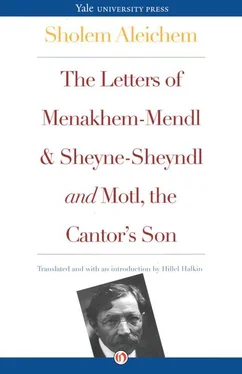In late 1914, more as a refugee from the world war that had broken out than as an immigrant counting on a better future, he sailed for New York again, this time with his family. He died there in May 1916, still struggling to make ends meet and writing practically to his last day. Despite failing health, he published in these months a large part of From the Fair and the unfinished American half of Motl. His funeral procession, said to have been the largest in New York City’s history, included more than one hundred thousand participants. Most were devoted readers. All over the Jewish world — in Warsaw, in Odessa, in London, in Jerusalem, in Vilna, in Berlin, in Buenos Aires — he was mourned by many times that number.
Menakhem-Mendl and his wife Sheyne-Sheyndl made their debut in 1892, when “Londons,” the first of the six chapters that compose the second, 1910 edition of their letters, from which the present translation is made, was published in a volume of the Jewish Folk Library. Chapter 2, “Stocks & Bonds,” appeared in 1896 in the periodical Der Hoyzfraynd, and Chapter 3, “Millions,” was serialized in the newspaper Der Yid in 1899–1900.
Although based on Sholem Aleichem’s experience with the Kiev and Odessa stock markets, these letters are hardly autobiographical. Not only is the scolding Sheyne-Sheyndl purely fictional, Menakhem-Mendl himself is too fatuous a figure to be considered a full-bodied imaginative projection of the author. Sholem Aleichem took apparent pains to emphasize this when he wrote in a preface to the 1910 edition that Menakhem-Mendl was not imaginary but a real person, with whom
the author is personally and intimately acquainted, having lived through a great deal with him for nearly twenty years. Since our first meeting in 1892 on the “Little Exchange” of Odessa, we have gone through all the circles of hell together. I was with him in the market in Kiev, all the way to St. Petersburg and Warsaw; went through crisis after crisis with him; threw myself with him into one livelihood after another; and — alas! — having had no luck, was forced to do what all Jews do and emigrate to America. [4] Menakhem-Mendl, “Tsu der tsveyter oyflage,” volume 10 of the Folksfond Edition (New York, 1917–1925), pp. i — ii.
And yet quite apart from the fact that Sholem Aleichem had not emigrated to America at this point and was reversing the order of the Kiev and Odessa crashes, this entire claim was fictional, since unlike Tevye, who was modeled on a real-life individual, no single prototype for Menakhem-Mendl existed. Or rather, the only such prototype with whom Sholem Aleichem went through “all the circles of hell” for “twenty years” was Sholem Aleichem himself, who, in inventing Menakhem-Mendl, isolated an element of his own character and exaggerated it wildly for comic purposes. Omitted in this translation, the 1910 preface is an ironically tongue-in-cheek document, designed to point the finger away from and toward the author at one and the same time.
Of course, the character of Menakhem-Mendl was also based on many of the small-time Jewish speculators and traders the author encountered in his years on and around the Exchange. Such types are described at length in the letters to Sheyne-Sheyndl and immediately identified by her, with her instinctive practicality, as luftmentshn, or “air people,” a Yiddish term denoting those would-be alchemists of profit who seek to make a living out of nothing — an enterprise that, as Sheyne-Sheyndl repeatedly warns, more often turns to nothing even the little that exists. And Menakhem-Mendl is the luftmentsh par excellence, so much so that in Yiddish his name has become a synonym for the term. Azoy a Menakhem-Mendl! — “What a Menakhem-Mendl!”—is both a way of calling someone an inept spinner of financial fantasies and a tribute to Sholem Aleichem’s powers of characterization.
But if Menakhem-Mendl is a superbly drawn caricature, he is one not only of the deluded believer in his own luck who compulsively gambles and loses each time, but also of a harsh economic reality in which the Jews of his time were trapped. Confined by tsarist regulations to the Pale of Settlement, the area of western and southwestern Russia whose largest metropolis, Kiev, was declared out of bounds to them (hence Menakhem-Mendl’s worries about being there); increasingly squeezed from their traditional occupations as small tradesmen and petty merchants by heightened competition and the growing availability of industrialized goods and services; and lacking access to entrepreneurial capital, Russia’s largely rural Jews were progressively reduced to marginal pursuits. One result was emigration. Another was proletarianization. Another was Menakhem-Mendelization — the creation of a newly urbanized class of Jewish fixers, jobbers, riggers, go-betweens, hangers-on, operators, and carpetbaggers frantically looking for the temporary niches and opportunities that could be manipulated for a quick gain. Menakhem-Mendl’s letters to Sheyne-Sheyndl are the classic portrait of this class.
It is the class aspect of Menakhem-Mendl that has particularly endeared his letters to Marxist literary critics, who have tended to consider them the high point of Sholem Aleichem’s career. Whereas, wrote the noted Soviet critic Max Erik, in Tevye “Sholem Aleichem glorified the petty bourgeois[ie] and portrayed it as an ideal …[in] Menakhem-Mendl, Sholem Aleichem unmasked the petty bourgeoisie.” Menakhem-Mendl “embodies the stubborn efforts of the lower middle class to make it into the bourgeoisie, to achieve the latter’s unfulfilled capitalist dreams”; he is “a compressed, highly trenchant expression of the illusoriness of the petty bourgeois existence under capitalism; a terribly bitter and decisive exposé of his ostensible independence and self-determination.” [5] Max Erik, “Menakhem-Mendl: A Marxist Critique,” translated by David G. Roskies, Prooftexts 6 (1986), pp. 24–25.
Precisely because, in other words, he is naively apolitical and makes no connection between politics and economics, or indeed, between the world of economic success he yearns to belong to and the system that controls this world for its own benefit, Menakhem-Mendl’s letters are revolutionary in their implications; for they tell us that nothing short of an upheaval in both his consciousness and society at large can emancipate him from the treadmill on which he must otherwise run until he drops.
Even leaving aside Sholem Aleichem’s own political views, however, which were conventionally middle class, critics like Erik exaggerate Menakhem-Mendl ’s “bitterness” and overlook how its hero, for all his pathetic denial of reality, is affectionately individuated in a way that is fatally flattened by reduction to a mere economic symbol. He has a zest for experience that, while it rarely understands what it is looking at, makes Kasrilevke several sizes too small for him; a refusal to stay down that causes us to laugh at him but never to pity him; and feelings, however primitive, for his wife and children, revealed when we hear his voice crack or change at key moments, that periodically break the spell of his self-absorption. Even his abandonment of his family to pursue his pipe dreams is an attempt to become the admired husband and father that, henpecked by a domineering wife, he cannot be at home, where his only future is to become either the storekeeper Sheyne-Sheyndl would like him to be or the teacher of children for which his unfinished studies qualify him. The never-explained dowry money that he absconds with in his first letter, and that is Sholem Aleichem’s device for setting the story in motion, is, we come to realize, the chance of a lifetime that Menakhem-Mendl can hardly be blamed — that he must even be credited with courage — for seizing.
Читать дальше












